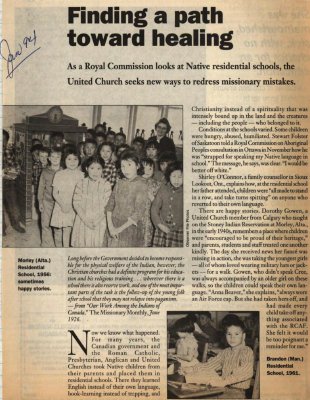"Finding a path toward healing"
- Publication
- United Church Observer, Jan 1994
- Full Text
- Finding a path toward healingAs a Royal Commission looks at Native residential schools, the United Church seeks new ways to redress missionary mistakes.Long before the Government decided to become responsible for the physical welfare of the Indian, however, the Christian churches had a definite program for his education and his religious training... wherever there is a school there is also reserve work, and one of the most important parts of the task is the follow-up of the young folk after school that they may not relapse into paganism. - from "Our Work Among the Indians of Canada," The Missionary Monthly, June 1926.
Now we know what happened. For many years, the Canadian government and the Roman Catholic, Presbyerian, Anglican and United Churches took Native children from their parents and placed them in residential schools. There they learned English instead of their own language, book-learning instead of trapping, and Christianity instead of a spirituality that was intensely bound up in the land and the creatures - including the people - who belonged to it.
Conditions at the schools varied. Some children were hungry, abused, humiliated. Stewart Folster of Saskatoon told a Royal Commission on Aboriginal Peoples consultation in Ottawa in November how he was "strapped for speaking my Native language in school." The message, he says, was clear. "I would be better off white."
Shirley O'Connor, a family counsellor in Sioux Lookout, Ont., explains how, at the residential school her father attended, children were "all made to stand in a row, and take turns spitting" on anyone who reverted to their own language.
There are happy stories. Dorothy Gowen, a United Church member from Calgary who taught on the Stoney Indian Reservation at Morley, Alta., in the early 1940s, remembers a place where children were "encouraged to be proud of their heritage," and parents, students and staff treated one another kindly. The day she received news her fiance was missing in action, she was taking the youngest girls - all of whom loved wearing military hats or jackets - for a walk. Gowen, who didn't speak Cree, was always accompanied by an older girl on these walks, so the children could speak their own language. "Anna Beaver," she explains, "always wore an Air Force cap. But she had taken hers off, and had made every child take off anything associated with the RCAF. She felt it would be too poignant a reminder for me."
- Media Type
- Text
- Publication
- Item Types
- Articles
- Clippings
- Description
- "Now we know what happened. For many years, the Canadian government and the Roman Catholic, Presbyterian, Anglican and United Churches took native children from their parents and placed them in residential schools. There they learned English instead of their own language, book-learning instead of trapping, and Christianity instead of a spirituality that was intensely bound up in the land and the creatures - including the people- who belonged to it."
- Publisher
- Observer Publications Inc.
- Place of Publication
- Toronto, ON
- Date of Publication
- Jan 1994
- Subject(s)
- Personal Name(s)
- Gowen, Dorothy ; O'Connor, Shirley ; Beaver, Anna.
- Corporate Name(s)
- Government of Canada ; Roman Catholic Church ; Presbyterian Church of Canada ; Anglican Church of Canada ; United Church of Canada ; Royal Commission on Aboriginal Peoples.
- Local identifier
- SNPL003941v00d
- Collection
- Scrapbook #5
- Language of Item
- English
- Creative Commons licence
 [more details]
[more details]- Copyright Statement
- Public domain: Copyright has expired according to Canadian law. No restrictions on use.
- Copyright Date
- 1994
- Copyright Holder
- Observer Publications Inc.
- Contact
- Six Nations Public LibraryEmail:info@snpl.ca
Website:
Agency street/mail address:1679 Chiefswood Rd
PO Box 149
Ohsweken, ON N0A 1M0
519-445-2954



